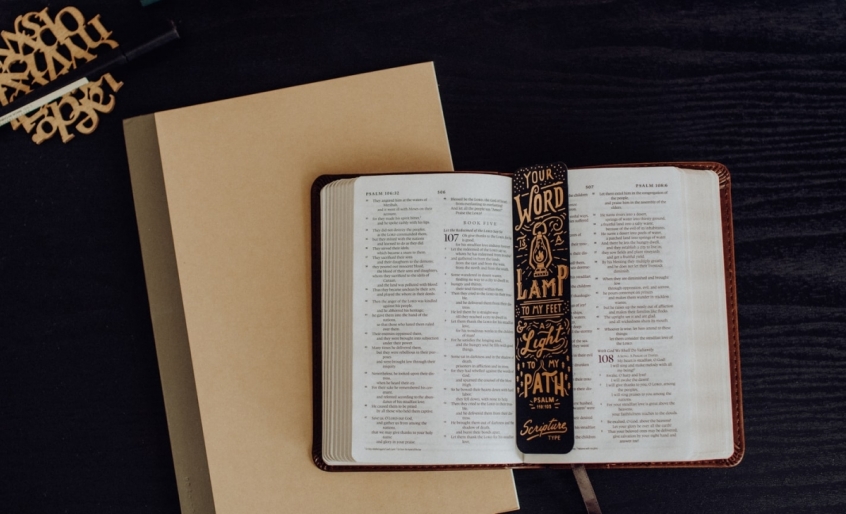
The Psalms have played an important role in Jewish and Christian tradition from ancient times until today. It is the oldest continually used songbook in human history. This is the story...
Origin of the Word
The English term Psalm is from the Greek word for a song accompanied by a musical instrument. This name comes from the Septuagint translation of the Hebrew word tehillim meaning songs of praise.
Authors
The "Book of Psalms", is also often called the "Psalms of David", although only about half were written by David. Some of them were written in response to particular events in David's life. The other psalms were written by, or attributed to, Asaph, the Sons of Korah, David's son Solomon, Ethan the Ezrahite, and some are anonymous. Psalm 90 is even attributed to Moses.
Books of Psalms
Although known today as the "Book of Psalms" the Psalms were sorted into five books. They were not sorted in the historical order they were written but, as the songbook of the Temple, they were sorted by theme.
The first book of psalms consists of Psalms 1 to 41, which are mainly Psalms of David. Book 2 consists of Psalms 42-72, including Psalms 44 to 50 which were by the Songs of Korah. Book 3 has Psalms 73-89, which includes the Psalms of Asaph. Book 4 has Psalms 90 to 106, which includes Psalms 93 to 100 which have the refrain "The LORD reigns". Book 5 has Psalms 107 to 150, Psalms 120 to 134 known as the "Songs of Ascent", and ends with the last five Psalms known as the Hallelujah Psalms.
The Greek translation of the Hebrew Scriptures called the Septuagint (often abbreviated as LXX) even had an extra 151st Psalm, which is found in Christian Orthodox Bibles. The Psalms vary in length from Psalm 117, which is only 2 verses, to Psalm 119 which has 176. The word "Selah", which appears many times throughout the Psalms, is left untranslated in Hebrew, simply because none of the translators know for sure what it means.
Jewish use of Psalms
The Psalms are poems which were set to music. David was a musician, known for playing the harp, but he was also a composer and even made some instruments (1 Kings 10:12). Instruments often mentioned in the Scriptures include lyres, timbrels, harps, cymbals and trumpets (1 Chronicles 13:8). The musicians set aside for worship in the Temple are listed in 1 Chronicles 25.
The Psalms were used in the first Temple until its destruction. The use of Psalms resumed during the time of Nehemiah after the rebuilding of the Temple (Nehemiah 12:27), which may be when they were organised as they are today. Later in Judaism it was customary for Jews to recite Psalms 136 and Psalms 113 to 118 during the Passover celebration. Jesus may himself have recited these at the Last Supper.
Psalters
Although it is basically a songbook or hymnbook, and some of the Psalms mention musical instruments, we do not have the original tunes. Instead, over the centuries people have used them in liturgy and put them to music according the musical styles of their tradition and culture.
Psalms have played an important role in worship in Jewish synagogues, and the Masoretic version marks them up with cantillation marks.
Their use continued in the Early Church, and in Orthodox, Catholic and Protestant churches, where they were used in liturgy and chanted or sung. In the Catholic and Orthodox world it was the custom for singing to be undertaken by the clergy or choirs. Communal singing such as Gregorian chant remains popular today.
Special editions of the Psalms printed for worship were called Psalters and in some traditions, there was the practice to re-translate the Psalms into poetic forms to fit the metre of worship, giving them the name 'metrical Psalms'.
Psalms in the Anglican tradition
In the Church of England (Anglican) tradition a system of plain chant developed to sing Psalms from the Bible by matching the rhythm of the words to the note of a melody. The Anglican Book of Common Prayer includes a separate Psalter, pointed for reciting and chanting. In fact, it is the same one used since it was first printed in Henry VIII's Great Bible of 1539.
This was based upon Miles Coverdale's translation of the Psalms published in 1535, which he translated from Latin and German. These are still sung in Anglican churches which use a choral tradition. They were revised for the King James Version in 1611, so the Psalms in the Book of Common Prayer do not exactly match the Psalms in the Authorised Version of the Bible.
Psalms in the Calvinist tradition
Another tradition arose in the Calvinist world. In 1545, John Calvin promoted the use of the congregational singing of psalms, set to church tunes. So metrical psalms became a feature of churches of the Calvinist tradition. The first was the Geneva Psalter, which was produced in French in Switzerland. A Dutch metrical psalter followed for use in the Dutch Reformed Church, and then others in German and in English. The earliest English language metrical psalms were produced in Geneva, Switzerland by English speaking Protestant exiles during the reign of Queen Mary I, in the 16th century.
The Scottish Psalter
John Knox brought this tradition back to Scotland, and in 1562 the General Assembly of the Kirk of Scotland directed that a Psalter be completed, which was based upon the language of the King James Version of the Bible. The General Assembly of the Kirk of Scotland authorised the 1650 edition called "The Psalms of David in Metre" for public worship, which is often called the Scottish Psalter. These are mainly in the 8,6,8,6 common metre and it is used across the English-speaking world. Notably Psalm 23 is still widely sung today as "The Lord's my shepherd...", and Psalm 100 is still sung today as the hymn "All people that on earth do dwell..." with the tune called "the Old Hundredth".
Gaelic Psalters
Scots Gaelic editions soon followed, and the 1826 Gaelic edition which is still used in Scotland today. A version of this was adapted for the Ulster dialect of Irish for the Presbyterian Synod of Ulster in 1836.
English Psalters
In English the first books of metrical psalms appeared in Tudor times. John Milton, better known for Paradise Lost, produced his own psalter in 1653.
A Psalter known as the Sternhold and Hopkins psalter was an early bestseller. It was popular with Puritans and Anglicans alike. It was often printed with editions of the Geneva Bible, and also with editions of the Book of Common Prayer. Sternhold and Hopkins became known as the Old Version, when it was superceded by the Tate and Brady psalter first published in 1696, which became known as the New Version. Psalms 34, is still sung today as the hymn "Through all the changing scenes of life".
Evangelical Use of Psalms
With the Evangelical Revival came a tradition of writing hymns based upon Scripture, most notably by Charles Wesley and Isaac Watts. This led to the decline of the pre-eminence of psalms in evangelical Christian worship. However, even today many Christian hymns and worship songs are still based upon psalms, even if it is not obvious, for example the Harvest Festival song "Bringing in the Sheaves" is based on Psalm 126.
Welsh Culture
There were very early editions of the psalms in the Welsh language. Welsh has its own poetic form with strict rules, called cynghanedd, and there was an edition of the psalms in cynghanedd by William Middleton in 1596. However, it was the metrical psalter by Edmwnd Prys published in 1621, which was published with the Welsh Book of Common Prayer, which had the most widespread use in Welsh-speaking churches. His version of Psalm 23 is said to have inspired Henry William Baker to write the popular English hymn "The King of Love My Shepherd Is". Poetry remains a highly respected art form in the Welsh language, and over the centuries, many bards have attempted their own editions of the metrical psalms.
The Psalms in Popular Culture
To a certain extent psalms remain part of popular culture. The composers Bach and Handel both set parts of the psalms to music. In 1958 famous Oxford writer C.S. Lewis, more famous for his Narnia series, wrote a book called "Reflections on the Psalms". In 1978, the pop group Boney M. had a hit with "By the Rivers of Babylon" which was basically Psalm 137 set to music with the chorus from Psalm 19:14.
Later in 1983, the Irish band U2 released a popular song called "40 (How Long)" which was basically Psalm 40 put to music, which they often ended their concerts with. In 1984, Leonard Cohen produced a song called "Hallelujah", made well known by its many cover versions, which starts with a reference to the Psalms with the lines "Now I've heard there was a secret chord, That David played, and it pleased the Lord".
Importance
Across all Jewish and Christian traditions, people today still read, chant or sing the psalms whether in prose, pointed or metrical translation, whether in liturgy or in worship, or even pop music. It is the world's oldest songbook still in use today. It is the Old Testament book most quoted in the New Testament, and today remains the most used book of the Bible.
Neil Rees is a publishing consultant, historian, freelance writer and speaker. He is also involved in youth work at his local village church, and guest preaching in churches of different denominations.













